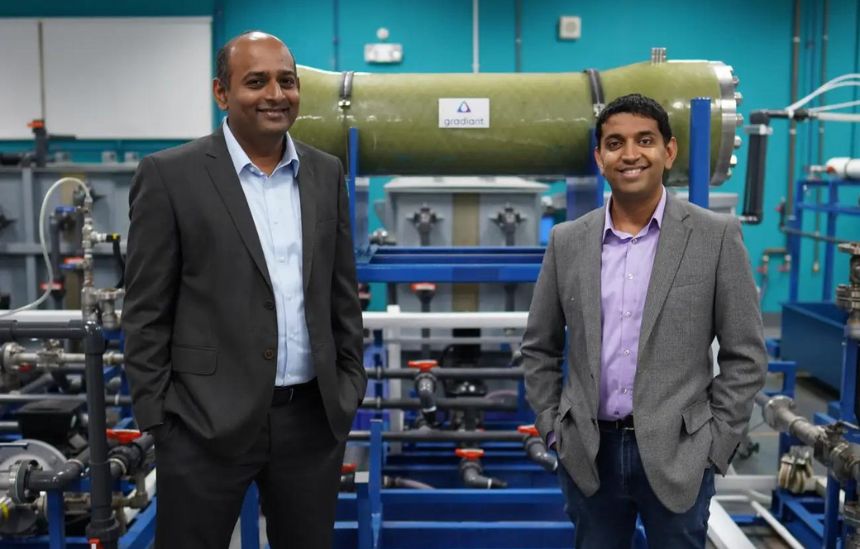Anurag Bajpayee wants to give nature its water back.
Groundwater is a finite resource, and humans have pumped up so much of it that it has tilted Earth’s axis of rotation.
Groundwater is freshwater that has soaked into the ground and is stored between tiny pores in soil and rocks. It is extracted and used for everything from drinking water to agriculture and manufacturing.
But climate change affects precipitation patterns, which, in turn, affect groundwater reservoirs. Many of them are at risk of running dry. Thanks to the climate crisis, extraction, and pollution, two-thirds of the world’s population may be facing a water shortage by 2025.
Increasingly, businesses are seeing water as a risk because many of them rely on it. It takes up to 40,000 liters of water to make a pair of jeans and a T-shirt and 2,000 to produce 1 kilogram of avocados, while training GPT-3 in Microsoft’s top US data centers could directly consume up to 700,000 liters.
Bajpayee’s Gradiant helps industrial businesses get this under control by treating and recycling used water. This means less groundwater is extracted, and it protects rivers from chemicals used in industrial processes when water is discarded.
The company, founded in 2013, became one of the VC ecosystem’s first water unicorns after a $225 million fundraise at a $1 billion valuation earlier this year. Gradiant has raised over $400 million from investors to date and counts BMW, Coca-Cola, Pfizer, and Taiwan Semiconductor Manufacturing Co. as customers.
“If you think about it, ever since the industrial revolution, we’ve just been taking water from nature,” Bajpayee told Insider. “The thought that, by doing what we do, we can turn the clock back and give nature water back, that’s the kind of stuff that sends chills down our spines and really motivates us to do what we do.”
Mimicking nature
The MIT spinout was launched with technology mimicking how it rains to purify water. The cofounder said nature was “very effective” at desalination, the process of removing minerals and salts from water that’s often used to turn seawater into freshwater.
“Wind blows over the oceans, and it picks up the vapor but doesn’t pick up all the other stuff, including the salt in seawater, and then the clouds blow over the land,” he said. “They reach the mountains, they cool down, and then we get the purest water that we naturally know.”
Using a humidifier and dehumidifier, Gradiant makes “clouds” and “rain” in the same way.
The system can be built with relatively simple materials, is highly reliable, requires little maintenance, and has high energy efficiency, Bajpayee added.
Today, the company treats 370 million liters of wastewater daily in the plants it has designed, built, and operated for customers. It has several systems for industrial-wastewater purification, desalination and reuse, drinking and ultrapure water, and waste minimization. It even says it has a system that can remove and destroy the PFAS forever chemicals.
Historically, desalination has been expensive because of the hefty energy requirements to separate salt from water. Bajpayee wouldn’t share specifics on the energy efficiency of Gradiant’s systems because they vary” but said that the company fared better than alternatives. If it didn’t, “then it wouldn’t make sense at all” as that’s where costs lie, he said.
Gradiant’s plants are run via algorithms, and some come with artificial-intelligence-powered digital twins as it looks to automate and reduce costs further. Bajpayee added that the company used fewer and, “in some cases,” no chemicals in its treatments.
A force for good in the EV transition
The company has attracted attention from the mining industry, partly thanks to the race to extract materials needed for electrification. Lithium, for example, is in high demand for electric-vehicle batteries.
In South America, lithium is extracted in salt flats through a series of ponds where water is evaporated over several rounds before leaving behind a bed of metal. The whole process is water-intensive and a blight on local communities often facing drought.
Instead of extracting freshwater from a saltwater solution, Gradiant can recover lithium from brine and is left with clean water as a byproduct. The process is called direct lithium extraction.
The extraction of minerals from brines generally requires less energy and comes with lower costs when compared with traditional mining, Iris ten Have, the science lead at the venture-capital firm Extantia who has a background in chemistry, said. It typically produces less waste and pollution, so it has a smaller footprint as a result, she added. Magnesium and potassium can also be extracted this way.
But scaling the process has its challenges.
“Brines are not just water with one type of mineral — they often contain various dissolved minerals, impurities, and contaminants,” ten Have said.
Separating and purifying the target minerals from this complex mix can be technically challenging, she added.
Having been founded a decade ago, Gradiant is one of the very few water-oriented venture-backed companies. The burgeoning space has garnered more attention in the past year, especially as the first-in-a-generation UN water conference in 2023 highlighted the alarming situation. Many public water companies trade at a market capitalization above $1 billion.
Other notable startups include the Leonardo DiCaprio- and Y Combinator-backed Waterplan, which helps businesses monitor and mitigate water usage via water accounting, and Hyfé, which recycles food and beverage wastewater. It nabbed $9 million from Synthesis Capital.
“Water technology is uniquely positioned to secure a critical resource, while simultaneously contributing to climate-change mitigation, but water has historically been undervalued, posing challenges in creating business models,” Lindsey Higgins, the research lead at the climatetech investment fund Pale Blue Dot, said.
“Today, growing global water scarcity is reshaping this perception, and we are just witnessing the beginning of what this means for innovation,” Higgins said. “I am confident that Gradiant will not be the last water unicorn we see.”
Source: Business Insider

